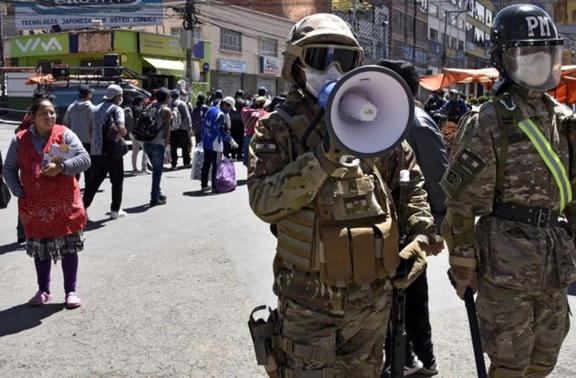
Interim Bolivian President Accused of Same Autocratic Style as Evo Morales
May 1, 2020 - Original article: US News
LIMA, Peru — When Bolivia's President Evo Morales was forced to step down last November amid mass protests against electoral fraud, it was just the latest chapter of his alleged abuses of the Andean nation's democratic order.
During his 14 years in power, the firebrand leftist had been accused by his domestic critics and international organizations that include Amnesty International, Human Rights Watch and the Committee to Protect Journalists of harassing critical nongovernmental organizations and the free press, and of violating the Constitution to sate his obsession with staying in power.
But as Bolivia faces new presidential elections sometime this year – the government postponed indefinitely the original May 3 date due to a nationwide lockdown because of the coronavirus pandemic – the conservative transitional government led by interim President Jeanine Añez is being accused of repeating and even exceeding Morales' authoritarianism, including locking up opponents on trumped up charges.
Michelle Bachelet, the United Nations High Commissioner for Human Rights, has spoken of her concern over "the tens of former functionaries of the deposed government and other people related to it who are now persecuted."
The Bolivian government's own official human rights agency, meanwhile, has also warned of "a pattern of violation of rights characterized by the excessive and abusive use of criminal allegations of sedition, terrorism and the failure to fulfill official duties (while in public office), that even transgress principles such as the presumption of innocence."
Some of those detained are suspected of corruption, such as former minister Carlos Romero. Morales himself is wanted for alleged "sedition," for encouraging protests against the transition government, which was formed when Añez, an obscure opposition senator, declared herself president in a power vacuum created by the resignation of more senior lawmakers from Morales' Movement Towards Socialism party (MAS by its Spanish initials).
Perhaps the most blatantly questionable arrests have been those of Morales' lawyer, Patricia Hermosa, and the former president's cousin, Hernán Solíz. Both are accused of sedition and terrorism, apparently, for simply having held telephone conversations with Morales from his exile in Argentina.
The persecution is further polarizing a deeply divided society, with many voters, particularly working-class and indigenous ones, still revering Morales, 60, a former coca grower and the country's first ever indigenous president, and resenting his ouster. In particular, they hail his anti-poverty programs, funded by high commodity prices and natural gas exports
Those feelings have only been inflamed by Añez, who had accused the former president's supporters of being "savages," and who is herself running to be president, despite initial promises that she would not do so as he could call into question her impartiality as interim president with control over the electoral agency.
Meanwhile, the administration of U.S. President Donald Trump, which has been vocal in its criticism of human rights abuses and attacks on democracy by left-wing Latin American governments, most notably the Maduro regime in Venezuela, has remained quiet about the situation in Bolivia. That silence is arguably giving the Añez administration the geopolitical breathing space it needs to continue pursuing its critics and MAS politicians.
Further fueling division in the country is the unknown nature of the presidential elections. When the Añez government suspended the elections because of the coronavirus pandemic, opponents accused her of using the outbreak as a pretext to grab more power. On Thursday the opposition-controlled parliament approved a law calling for elections within 90 days, prompting outcry from Añez.
Both developments potentially undermine Bolivia's chances of healing, and could raise questions about the legitimacy of any future election results.
Javier Murillo de la Rocha, dean of the social sciences faculty at the Catholic University of Bolivia, dismisses those risks and defends the Añez government, although he admits it would have been "desirable" that the interim president sit out any future elections.
"You can't compare the magnitude of the persecution under Morales, which lasted 14 years, with anything going on now," Murillo de la Rocha says. "He subjugated the entire justice system, and used his large parliamentary majority to avoid scrutiny. He stopped democratic checks and balances on his government."
But Claudia Peña, a former minister in the Morales government, warned that the coming elections were not being held on a free or fair basis and that there are now "political prisoners" in Bolivia.
"They have not had due process," she adds. "If they had, they would not be in jail as there is no evidence. Of course, this affects the elections. Candidates are wondering if they are safe right now, or whether they will be arrested just for campaigning."
Currently, Morales' preferred successor, Luis Arce, the former economy minister from the diehard wing of the MAS, leads the polls with around 30%. To avoid a runoff, he would need a minimum of 40% plus a 10% lead over his nearest rival.
Meanwhile, the anti-Morales opposition is divided between the centrist former president Carlos Mesa, who was runner-up in October's disputed election, and Añez. Should he make it to the runoff, Mesa, with his message of healing and balanced criticism of the excesses of both the Morales and Añez governments, is tipped to beat Arce.